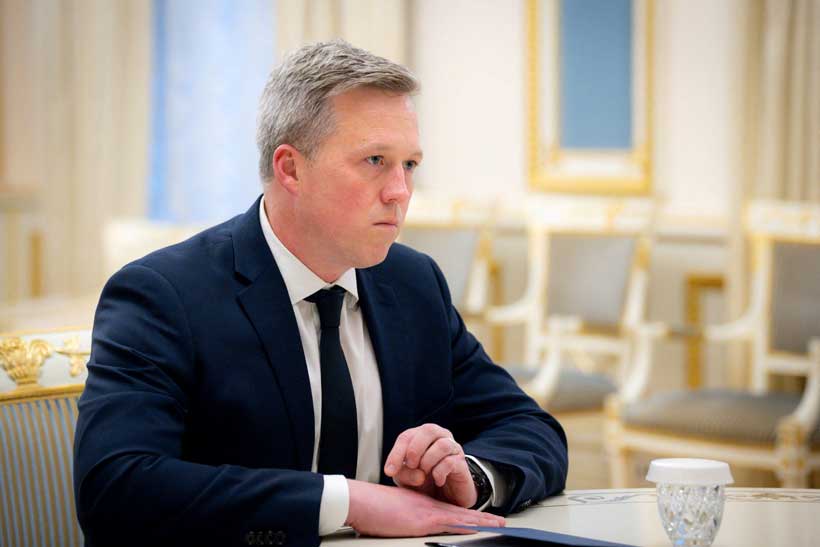The recent revelation of quiet contacts between the Trump administration and representatives from Russia and Ukraine has pushed an unfamiliar name into the spotlight: Dan Driscoll, a discreet presidential adviser tasked with managing some of the administration’s most sensitive diplomatic channels. Until now, Driscoll operated largely out of public view. Today, he is emerging as a key figure in efforts to test whether Moscow and Kyiv might be willing to move toward a negotiated de-escalation.
Although he does not hold a traditional top-tier diplomatic post, Driscoll’s ascent illustrates the Trump administration’s continued reliance on trusted insiders—individuals chosen for loyalty, discretion, and operational discipline—rather than career diplomats embedded in Washington’s foreign-policy institutions.
From the Private Sector to Quiet White House Influence
For most of his career, Dan Driscoll worked in the private sector, holding senior roles in technology and cybersecurity firms. He was involved in projects related to data strategy, critical infrastructure protection, and corporate risk assessment. Colleagues describe him as disciplined, highly analytical, and deliberately low-profile—a personality that made him a natural fit for the Trump administration’s informal, non-bureaucratic style of managing sensitive tasks.
Sources familiar with the administration’s personnel decisions say Driscoll gained Trump aides’ trust because he could handle sensitive discussions “without creating noise.” According to one official who spoke with DW, “He’s the kind of person the president can rely on to keep information tight and focused.”
A Key Player in U.S.–Russia–Ukraine Backchannels
Driscoll’s name surfaced publicly after reports confirmed that he had been involved in a series of discreet contacts with Russian and Ukrainian interlocutors. These exchanges, which took place in several locations in Europe and the Middle East, were part of a U.S. effort to determine whether a pathway toward a ceasefire—or at least a reduction in hostilities—might be feasible.
According to officials from the State Department and National Security Council, Driscoll served as a “technical intermediary,” responsible for coordinating preliminary signals, gathering reactions to U.S. proposals, and narrowing areas of potential convergence. These early-stage conversations—often described as pre-talks—are essential for assessing whether formal negotiations could succeed.
Multiple sources say Driscoll was tasked with transmitting the administration’s initial ideas about what Trump has referred to as a “pragmatic and rapid peace approach,” while also evaluating how far Moscow and Kyiv were willing to consider confidence-building measures.
Security Vetting and Political Controversy
Driscoll’s sudden prominence in high-stakes diplomacy triggered debate in Washington. Some members of Congress questioned whether a non-traditional adviser with limited diplomatic experience should be involved in one of the world’s most complex conflicts.
However, documents reviewed by DW and verified by security officials indicate that Driscoll underwent full security vetting, including enhanced background checks, financial transparency reviews, and conflict-of-interest assessments. Nothing in his record suggests he lacks the credentials required to handle classified material or participate in sensitive discussions.
Analysts say the controversy reflects broader tensions surrounding the administration’s unconventional diplomatic style, rather than concerns about Driscoll personally. Sam Greene of King’s College London noted, “Trump favors parallel channels that bypass traditional bureaucratic structures. It can produce fast results, but it also creates uncertainty for partners who are used to institutional continuity.”
Kyiv and Moscow: Cautious but Engaged
Ukraine’s reaction to Driscoll has been measured but pragmatic. Officials familiar with the meetings describe him as someone who listens carefully and avoids making premature commitments. His presence, they say, signals Washington’s intent to explore options without locking Kyiv into politically sensitive positions.
Russian state media have adopted a skeptical tone but acknowledge that Driscoll functions as an “effective working-level contact.” Some Russian diplomatic sources interpret his involvement as a sign that Washington wants to re-engage Moscow in a low-key format—one that avoids the political constraints and public posturing surrounding official negotiations.
The White House’s Quiet Posture
The Trump administration has remained notably silent about Driscoll’s exact responsibilities. In a brief statement, a White House spokesperson said only that the president is “using all available tools to promote peace,” without commenting on individuals or specific channels.
This silence reflects a familiar pattern. From Jared Kushner’s role in the Middle East portfolio to covert preparatory talks with North Korea before the 2018 summit, the Trump team often relies on informal envoys and private intermediaries. These operators are expected to take risks and float ideas that formal diplomats cannot easily introduce.
In the context of the Russia–Ukraine war, the use of a low-profile adviser like Driscoll suggests an attempt to shield early contacts from political pressure and media scrutiny—particularly at a time when Congressional debates over U.S. commitments in Europe remain fractious.
A Quiet, Technical Negotiator
To many observers, Driscoll is not a “grand negotiator” shaping outcomes through high-level diplomacy. Instead, he plays the role of an early-stage broker—someone who quietly tests boundaries, exchanges proposals, and identifies what each side might realistically consider.
His emergence illustrates a broader trend in American foreign policy under Trump: the rise of behind-the-scenes technocrats entrusted with sensitive missions precisely because they are not public political actors. These individuals operate in the gray zone between official diplomacy and strategic outreach, enabling the administration to explore ideas before turning them into policy.
Whether Driscoll’s efforts will lead to formal negotiations remains unclear. But his sudden visibility underscores how critical—yet often invisible—such intermediaries are in moments where geopolitical confrontation intersects with political uncertainty.
For now, Dan Driscoll remains what he has long been: a silent operator at the intersection of national security, political trust, and improvised diplomacy—a reminder that in high-stakes conflicts, the most consequential work often happens far from the cameras.


